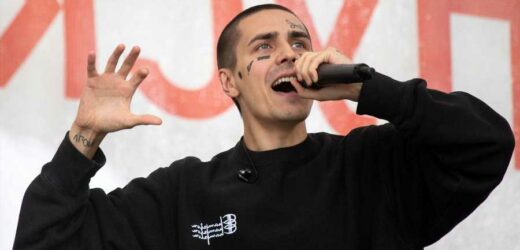Vladimir Putin gave one of Russia’s most controversial rappers a special birthday present this year: designation as a foreign agent. The first musician to ever receive the government branding, rapper FACE spent his 25th birthday elated by the news.
“I’m proud of it. It’s the best birthday gift I’ve ever had,” the disruptive young rapper told Rolling Stone. “So many people have congratulated me on it. It describes our country somewhat right now that this status should be seen as a type of shame.”
A vocal critic of the Russian invasion of Ukraine, FACE has more than a million monthly Spotify listeners and an even larger Instagram footprint. Which means he is a force to be reckoned with for a government increasingly intent on curbing freedom of speech. Moscow often uses the foreign agent designation to target and harass some of its most persistent critics, ranging from institutions to private individuals. Those on the list may contend with unexpected legal hurdles and onerous government regulations that can cause financial hardship and sow fear.
Reading the room in early 2022, FACE bounced from Russia the country shortly before the Kremlin’s invasion of Ukraine. It is a decision that for him has proved timely, and that he hopes is just the next step in his ever-evolving career. Now, with his homeland invading its neighbor, the rapper has been full-throated in his condemnation of his government’s behavior.
“My country attacks its neighbors – that’s the worst thing,” he said, adding that stopping the war, which has left thousands dead and more than seven Ukrainians million displaced, should be every Russian’s top concern. “We as Russians need to think about ourselves second and first think about what our country is doing to its neighbors.”
FACE is no stranger to politics. Like fellow popular rappers Morgenshtern and Oxxxymiron, FACE is one of a handful of major Russian celebrities to openly criticize the war. In March, the rapper launched a series of Instagram posts condemning the Russian invasion. “The Russian state is to blame,” he wrote. “They call themselves the carriers of the Russian spirit, but they are cowards.”
For FACE, who once staged a reading of passages from George Orwell’s 1984, the political climate in Russia is as warped as the wordplay that Big Brother uses to rewrite history in the classic dystopian novel. With a national identity built in part on helping defeat the horrors of Nazism in the Second World War, Putin’s government has instead co-opted the idea of “denazification” – one of Russia’s nebulous war goals in invading Ukraine – to advance the goals of a Russia that in FACE’s opinion is much more akin to Germany in 1939 than the Soviet victors.
“It’s just government lingo. ‘Denazification,’ they’re talking in some type of terms that nobody can understand, even themselves. They’re just talking about something to just talk about it. That’s really some type of bullshit,” FACE said. “Russia right now looks more similar to Nazi Germany than Ukraine, [both] before the war and right now.”
The rapper’s politics, like his music, have evolved across his career. In his youth the rapper, born Ivan Dremin, was briefly drawn into the far-right soccer hooligan culture in his hometown of Ufa in Russia’s south. Estranged from his parents and struggling in school, it was through his exposure to American rap music that FACE broke away from right-wing extremism and started to adopt a more egalitarian outlook.
“I just loved rap music. There’s always been rap music in my life,” he said, noting that there was one hard-driving early 2000s artist that helped make the full-on conversion to hip-hop head possible. “But In da Club – I just loved it.”
As he delved deeper into American rap, FACE’s taste expanded beyond 50 Cent and into Southern hip hop. He became sucked into the syrupy flows of Southern rap empresarios Bun B and Juicy J – the influences of which are heard in the sludgy crunch of the popular Russian rap subgenre of phonk – as well as the bouncier Miami and New Orleans scenes. Eventually his exploration led him into the frontier of Soundcloud rap, with collectives like the Raider Klan and Sad Boys proving crucial in his rap education.
It would be his early tracks more in line with this Soundcloud style that would act as his ticket out of Ufa and into Russian internet stardom. His early 2016 video playfully sending up famous Russian fashion designer Gosha Rubchinskiy quickly went viral and launched him onto the national stage.
Refining his sound followed shortly, as did nationwide tours that increasingly came under the scrutiny of hostile local authorities who found his lyrics too subversive for their liking. His role in heading the title song for the dark comedy film Humorist, as well his 2018 government-critical album Inscrutable Ways, cemented him squarely into the opposition camp – even as many of Russia’s top rappers remained non-political.
As his popularity took off FACE famously rebuffed efforts to become a government-supported artist, a type of conferred status that famously blew up in the face of pro-government rappers Timati and Guf following a pro-Putin video so over-the-top terrible that it nearly broke Russian YouTube.
Government hounding slowly drove FACE underground as his traction grew. Belarusian officials scrapped a Minsk appearance, the Russian government banned the lyrics of his song Suicide, and threats from authorities forced him to scrap much of a Russian autumn tour last year. The rapper found himself increasingly in a state of limbo not unlike the title character of Humorist who must navigate the fine line between officially allowed performance and prohibition.
“I have no sense of humor, otherwise I’d have laughed long ago about the life situation I got in,” he riffs as the lead in the Humorist video, playing a character facing KGB persecution for his comedy. “There’s no rope? Then choke me with a tie.”
FACE, talking from his ad hoc studio, says his musical dreams are much more in line with the enterprising spirit of the late Nipsey Hussle or the layered sonic tunnels of Bladee and Ecco2k than the 50 Cent commercial radio bangers that scored his delinquent youth. His songwriting process is simple and self-made: spitting out lyrics and beats over his personal laptop. Not exactly the behavior you’d ordinarily associate with a foreign agent.
“It was like the world against me [growing up]. I had strong criticism from my family, from my older siblings, from my schoolteachers and this type of Soviet people, and I grew up in this atmosphere, so really there was no choice besides independence in my life,” he said. “And I think from that moment I have always stayed independent – with nobody fucking my brain up.”
FACE has actively cultivated a fandom across the Russian-speaking world. Pre-war concerts in Ukraine contrasted sharply with his sets in Russia and Belarus that were almost as likely to be banned as allowed. In post-Maidan Ukraine, however, FACE found a vibrant post-Soviet democracy with greater personal freedoms that could serve as a beacon for his generation in Russia.
It is a fear of Ukraine’s success, FACE suspects, that underpins much of the logic behind Russia’s current invasion.
“In the last 10 years between the three countries of Belarus, Ukraine, and Russia, we have only seen an up-and-coming democracy in Ukraine,” he explained. “If democracy can win in Ukraine, then our people, and the Belarusian people, can take inspiration from it and fight in some way for our own freedom and for our own democracy. That’s one of the reasons right now that Russia invades Ukraine.”
It’s this young generation that helps FACE remain optimistic, and one that he believes may eventually upend the more hardline ways of thinking he says are currently en vogue.
“We have a lot of Soviet mentalities still going on in the older generations,” he said, adding that current Russian leadership perpetuates an imperial attitude toward neighboring countries and ethnic minorities. “But there’s really a freedom mentality going on in Russia in the younger generation. It’s my hope for a bright future in Russia and neighboring countries. I’m fighting exactly for this part of my people.”
FACE’s anti-war quest is also personal. It is the example of his great grandfather that animates some of FACE’s worldview. A Red Army battalion commander, service took him to the maelstrom of some of the Eastern Front’s most instrumental battlefields, including Berlin, Stalingrad, and Kursk. Amid these campaigns he oversaw the fording of several rivers under enemy fire as Soviet counterattacks peeled back the German invaders. But according to FACE, his great grandfather never bragged about his battles.
“He was just like, ‘I’m a hero, but I don’t give a fuck,” FACE explained.
FACE realizes that the foreign agent designation and his highly visible role puts a wider target on his back from Putin and his partisans, but he won’t let these threats dissuade him, instead taking it in stride much like the boasting persona he broadcasts in the wry track My Kalashnikov.
“Be born, suffer, die, and go to heaven,” he raps darkly in the song’s tumbling chorus. “Nothing scares us.”
A return to Russia, though, is unlikely in his near future. Like many countervailing artists before him and mirroring trends in the growing Russian diaspora, FACE now partakes in a long-standing tradition of dissent from abroad, knowing that remaining in his home country may simply be too dangerous. It is a fact to which he is resigned as he dreams of a post-Putin future.
“Russia is some kind of prison country. You say something, you go to prison,” he lamented. “It’s really some type of terror machine.”
Source: Read Full Article


